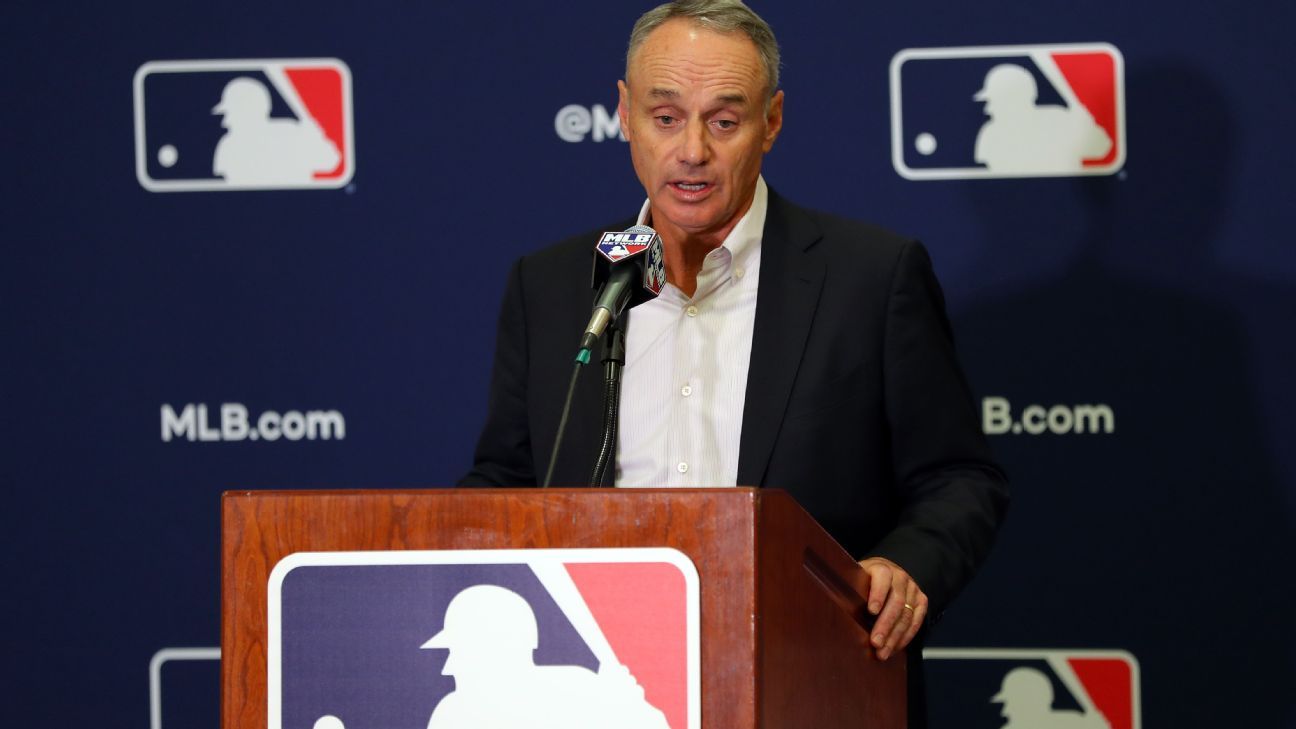
Major League Baseball commissioner Rob Manfred on Thursday night outlined the coronavirus-testing protocols the league hopes to implement, telling CNN that frequent tests will be key to the sport’s restart and that a positive test won’t mean shutting down an entire team.
Manfred said the league, which plans in the coming days to discuss in-depth health-and-safety protocols with the MLB Players Association, intends to test players and other baseball personnel multiple times a week using a drug-testing lab in Utah it converted to process thousands of COVID-19 tests weekly. Additionally, for those who show coronavirus symptoms, the league would use rapid point-of-contact testing to determine whether they are infected. Were someone to test positive, Manfred said, that individual would be quarantined, and those who have come into contact with the person would be rapidly tested as well. Those who do test positive, Manfred said, would be quarantined until testing negative twice over a 24-hour period.
“Our experts are advising us that we don’t need a 14-day quarantine,” the commissioner told CNN anchors Anderson Cooper and Dr. Sanjay Gupta. “What we will do is, the positive individual will be removed from the rest of the group. There will be a quarantine arrangement in each facility in each city and we’ll do contact tracing for the individuals that we believe there was contact with and we will do point-of-care testing for those individuals, so minimize the likelihood that there’s been a spread.”
MLB hopes to begin the regular season in early July but first must convince players to sign off on a return-to-play protocol. Manfred on Tuesday began to outline MLB’s plans in a meeting with the MLBPA and told CNN he is confident the league and union will strike a deal.
“We hope that we will be able to convince the vast majority of our players that it’s safe to return to work,” Manfred said. “The protocols for returning to play, the health-related protocols, are about 80 pages in length. They’re extraordinarily detailed.
“So we hope that we’ll be able to convince them that it’s safe. At the end of the day, however, if there’s a player with either health conditions or just their own personal doubts, we would never try to force them to come back to work. They can wait until they feel they’re ready to come.”
The protocols, Manfred said, include everything from the cleanliness of chartered flights between series to reduced exposure by players to stadium workers. But testing will be the key to it all working, he said.
“All of our players would be tested multiple times a week — PCR testing to determine whether or not they have the virus,” Manfred said, referring to the polymerase chain reaction tests that would be shipped to the SMRTL lab in Utah and processed in 24 hours. “That testing would be supplemented less frequently by antibody testing as well.”
MLB is hoping to begin a second spring training — the first was interrupted by the pandemic in March — in June, followed by the start to the regular season in early July. But that’s contingent on the public-health situation at the time.
The plan is to play without fans at home stadiums where local government officials allow. Manfred said the situation isn’t risk-free but that the league’s goal is to reduce that risk as much as possible.
“The lab in Utah has assured us of a 24-hour turnaround on all of our tests,” Manfred said. “So we feel comfortable that by doing multiple tests a week and trying to minimize that turnaround time, we’re doing everything humanly possible to make sure that the players are safe.”
There are other hurdles to clear before a potential restart, notably coming to an agreement with the MLBPA on salary.
Owners approved a plan Monday that would pay players a percentage of their 2020 salaries based on a 50-50 split between players and owners of MLB’s revenue from the regular season and postseason, sources told ESPN. The union views that concept as a salary cap, to which it has said it will never agree. Manfred said if there is no season, teams could lose as much as $4 billion, and some teams believe they will lose money even if games are played.
Rays pitcher Blake Snell sounded off on MLB’s economic plan Wednesday in a Twitch stream, saying he would not play if the league cut players’ pay beyond the pro-rated salary outlined in a March agreement between the league and players.
“I think that whenever there’s a discussion about economics, publicly people tend to characterize it as a fight,” Manfred told CNN. “Me personally, I have great confidence that we’ll reach an agreement with the players’ association — both that it’s safe to come back to work and work out the economic issues that need to be resolved.”
Manfred said the league is exploring many options for 2020, including rule changes while also attempting to “enhance” a television-only product. Ultimately, he said, the difficulties in returning will not prevent the league from attempting to start the season.
“Playing in empty stadiums is not a great deal for us economically, but our owners are committed to doing that because they feel it’s important that the game be back on the field, and that the game be a sign of a beginning to return to normalcy to American life the way we’ve always enjoyed it,” Manfred said. “We’re a big business, but we’re a seasonal business, and unfortunately, this crisis began at kind of the low point in terms of us for revenue — we hadn’t quite started our season yet. And if we don’t play a season, the losses for the owners could approach $4 billion.”
ESPN’s Jeff Passan contributed to this report.


